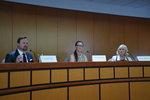

Three different local races that will be on the ballot Aug. 7 were the subject of candidate forums July 14 as contenders for county, regional and state offices took questions at the Clark Regional Wastewater District headquarters.
17th Legislative District
The first forum of the day featured two candidates for representative in the 17th District. Incumbent Rep. Vicki Kraft, R-Vancouver and challenger Tanisha Harris, a Democrat, took questions ranging from volunteer service to campaign finances. It is worthy to note that these two are the only candidates actively campaigning, meaning they are likely to breeze through the primary election and into November’s general. Democrat James Tolson announced his campaign was suspended last month.
Regarding volunteering, Kraft said she had primarily worked with the Hazel Dell Boys and Girls Club, adding that youth were a chief reason she initially decided to run for office.
Prior to Harris’ current job as a specialist for an advocacy program at YWCA Clark County, she had volunteered for the organization that focuses on social justice.
Harris also mentioned she was co-chair for Evergreen Citizens for Schools which worked to pass a nearly $700 million bond earlier this year.
Regarding the state Growth Management Act, Harris said that there weren’t any specific changes in state growth law. Rather, she would focus on the specific needs of municipalities noting the mix of urban, suburban and rural areas in the district.
Kraft said she would be mindful on protecting rural communities in the district, though she admonished that any changes made in the legislature would be statewide and it would be important to be mindful of any sweeping change.
Regarding affordable housing, Kraft said it was her opinion that lack of supply has exacerbated the issue. She said looking at law around urban growth boundaries and the cost and process of permitting was important to the issue, citing a Building Industry Association of Clark County statistic that said in 2016 $71,000 of every new home’s price was a direct result of government regulations.
Harris said that the issue was across different income levels, adding that she would support incentives for developers to build more affordable units. She noted that this year legislation regarding rent control died in committee, explaining that might be an avenue to take as well as eviction law changes.
“Twenty, 30 days is not acceptable for so many of our families, who do live paycheck to paycheck, who get that eviction notice through no fault of their own,” Harris said.
Regarding the recently-resolved McCleary school funding decision by the state supreme court, Harris said there was still more work to be done regarding pre-kindergarten, special and postsecondary education, mentioning that it might require a “McCleary 2.0” to address those aspects.
Kraft was more satisfied with the prior work to meet the decision’s mandate, saying that a second overhaul in a McCleary 2.0 wasn’t necessary.
“52 percent of your taxpayer dollars in the general fund in the state go to K-12 education, and that is a result of McCleary,” Kraft said.
The conversation shifted to corporate tax breaks with the candidates offering differing viewpoints, alluding to issues the state has faced with Boeing and what makes a good corporate citizen.
Harris said a good corporate citizen was one that put people before profits while still being able to make profit.
Kraft spoke more favorably of Boeing, explaining she recently toured their operations and learned of the thousands of jobs, volunteer hours and funding the company provides to the community.
The two candidates were also in contrast regarding campaign finances. Kraft said that although much of campaign finance reform looked at corporate interests if that were to go, money from labor unions would need to go as well, saying the issue was a two-way street.
“Labor needs to be a good player also,” Kraft remarked. She also took issue with the initiative process, saying out-of-state money was a big influencer in those elections.
“As Ms. Kraft said that labor money would be supporting my candidacy I can say that corporate money would be supporting her candidacy,” Harris said. Although there could be arguments on whose money was “better” she said it was important to look at who and what those financial contributions were representing.
Clark County Council Chair
The candidates for the at-large head of Clark County Council took questions during the forum, though incumbent Marc Boldt, no party preference, did not attend.
There was however a county councilor at the forum, as current District 4 representative Eileen Quiring is running for the chair position. Quiring, a Republican, was joined by Democrats Christy Stanley and Eric Holt.
Regarding leadership style, Stanley said hers was that of a visionary and a hands-on person, explaining she was not one to ask someone to do a job she wouldn’t do herself. Quiring said she was more of a team leader, mentioning her past experience as an Oregon state legislator in the 1990s taught her the importance of collaboration.
“There will always be something where you will agree,” Quiring said.
Holt said it was important to be able to inspire people, not simply lead them through some process, while still setting out a clear agenda and holding people accountable.
County land use was a topic of discussion, with Holt saying that in order to fulfill responsibilities to cities the county needed to embrace “slow, sustainable growth” focused within urban growth boundaries while also supporting affordable housing, not “$650,000 McMansions.”
Stanley said that the commuter nature of much of the residential area of Clark County was causing issues with affordable housing, stressing the importance of bringing business to the area and not relying on Portland industry.
Quiring said that contributing to the issue of land availability were outdated metrics, mentioning specifically a vacant buildable lands formula and population projections as problem areas. She said issues with the metrics were creating a “false” scarcity of land, limiting how much urban growth boundaries — and thus usable land — was available.
Candidates were split when it came to industrial development along the Chelatchie Prairie Railroad, something now allowed under recent changes to state law.
“There are a lot more cons to this deal than pros,” Holt said, noting a proposal to allow industrial development within a mile of the rail line. He claimed there was the potential for hazardous chemicals to be transported on the railroad, something Quiring refuted as speculative as nothing has been finalized regarding what types of industry would be available.
Quiring noted that her work on an Oregon-Washington committee regarding tolls on Portland-area interstates has emboldened her push for the industrial development as a way for Clark County to have its “own economic engine,” adding that through the process there would be careful consideration for nearby residents and possible impacts.
Though Stanley agreed with Holt that there needed to be more discussion regarding what type of development would happen, she was in support of the plan to bring industry to the railroad. She said it fit in with her push for more business on the north side of the Columbia.
Clark PUD District 1
Three candidates for the Clark Public Utilities District Commissioner answered questions during the final forum of the day.
Incumbent Jim Malinowski was joined by challengers Judy Chipman and Sherry Erickson to answer questions about the nonpartisan position on the utility’s board of commissioners.
Malinowski said he was seeking re-election to continue the policies of the current utility administration, pointing to accolades from J.D. Power and Associates from whom the utility received recognition for the eleventh-straight year in customer satisfaction.
Chipman said she recently retired from the Bonneville Power Administration which is a primary provider of power to the utility and thus has experience with Clark PUD, noting that prior to retiring she had mulled the idea of running. She said that she wasn’t running to necessarily make changes. Rather, she saw in the future the possibility of staple leaders at the utility retiring, meaning the commissioners would be making important decisions regarding leadership.
Chipman pointed to her time on the Columbia Credit Union board for nine years including three as chairman as an asset for the commissioner role, explaining that during her tenure the board selected a new CEO.
“The board of Columbia Credit Union operates very much like the board of commissioners for Clark PUD,” Chipman said, basing her reasoning off of past utility district meetings she attended.
Erickson said the position interested her because of its technical nature, citing her 22 years of experience in engineering as an asset. She said her primary responsibility as commissioner would be as an advocate for the customer, it being a public utility, adding that being “a responsible steward” of the utility’s resources was also important, something she has experience with as a consulting engineer.
Candidates were asked for five-year plans for their priorities if elected. Other than continuing the current level of customer service, Malinowski said that monitoring the west coast energy markets was another priority, as investments in solar and wind energy in California have changed how and when energy is consumed.
Apart from market monitoring, Chipman said it was important to focus on the utility’s connection to economic development in the region.
“I think Clark PUD is the backbone of industry in Clark County,” Chipman said, as it provides power and water to much of the area including businesses. She stressed a focus on being a stakeholder at the table when talking to ports or other entities for development opportunities.
Erickson said her focus as commissioner was on fiscal responsibility for the utility, highlighting transparency and accountability as goals. She added that stewardship of the county’s streams and watersheds is important, mentioning the Paradise Point Water Supply Project in the works that would supplement water resources in North County as an example of the impacts the utility has.
The candidates for utility commissioner had the most overlap of policy preferences of the three forums, with all three generally being in support of energy conservation efforts while keeping the course of affordable rates and strong customer service.
“If utilities are boring to you, we are doing a great job. That’s our goal,” Erickson remarked.